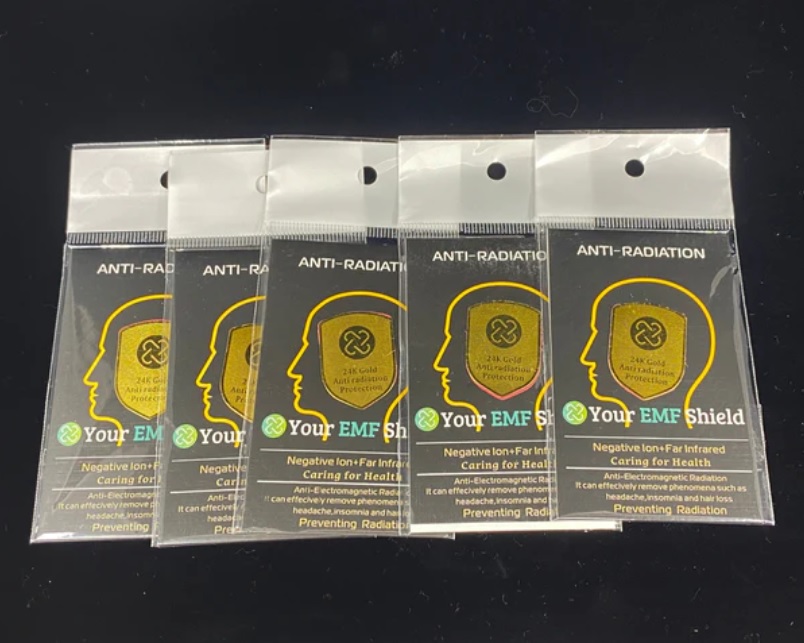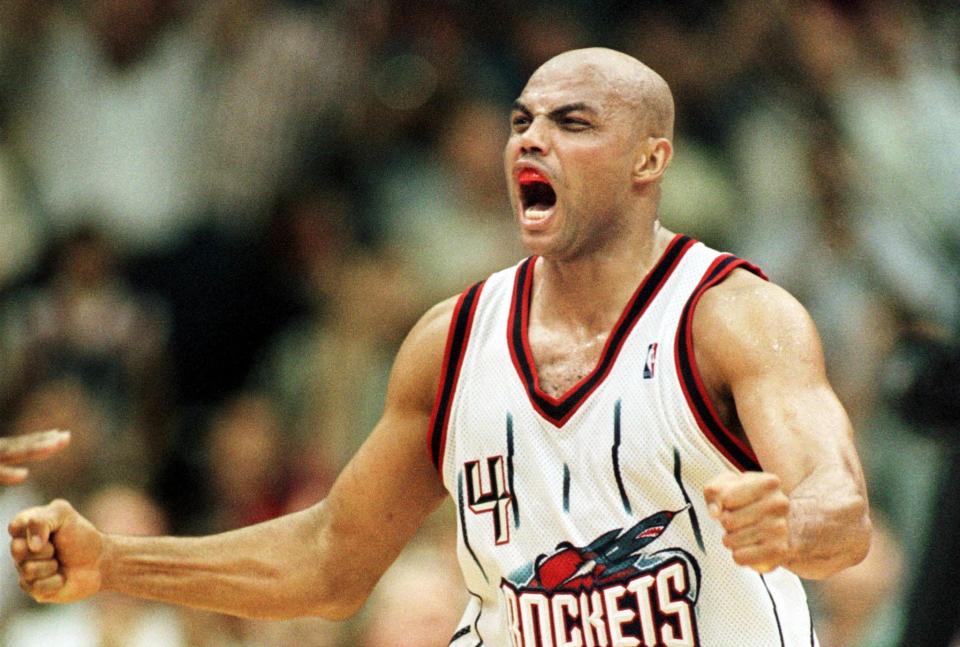
Barkley: A Biography by Timothy Bella. Hanover Square Press; Original edition (November 1, 2022).
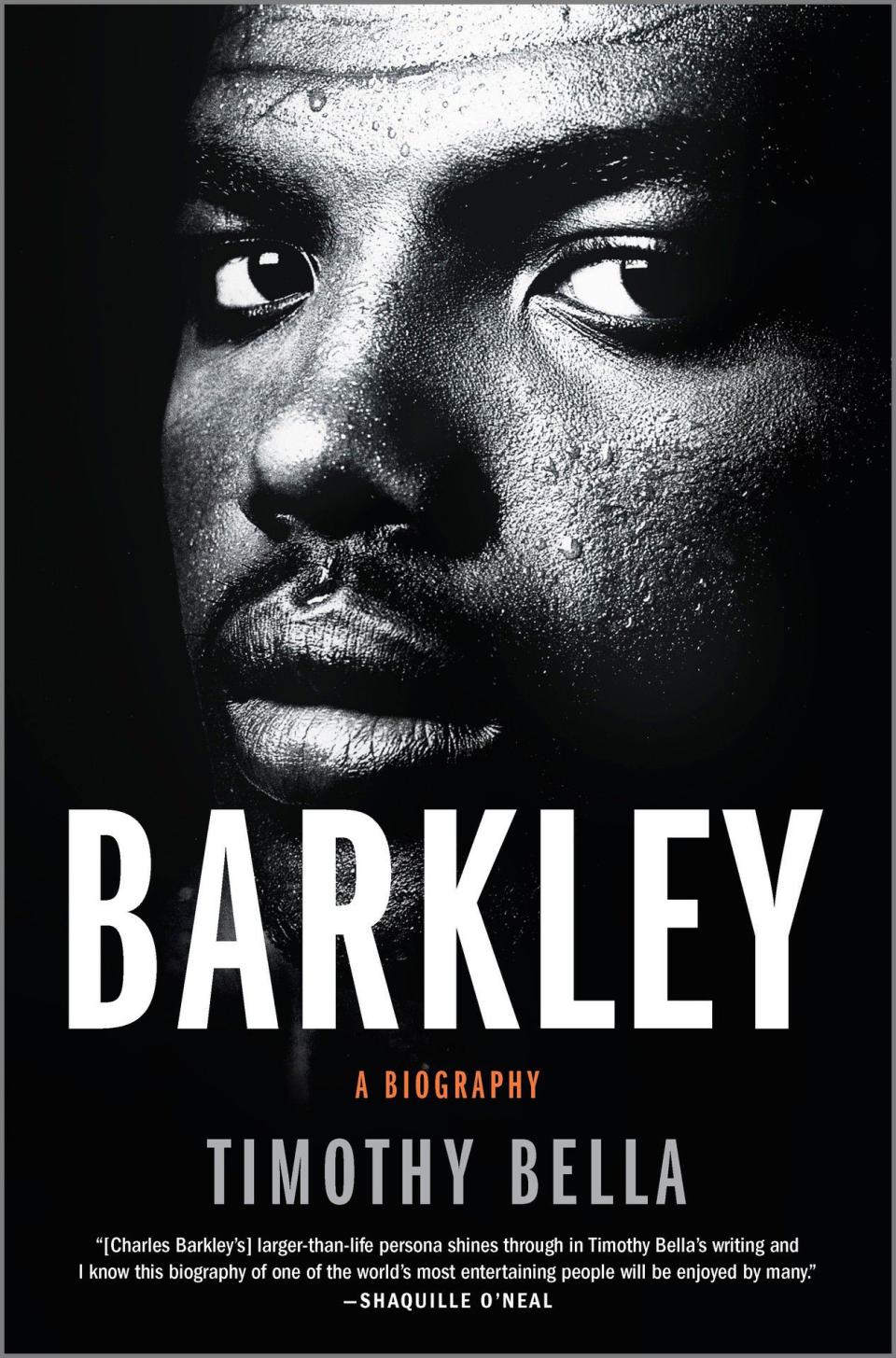
The end sounded like a sharp crack.
On a bitter cold night in 1999, Charles was introduced to the crowd in Philadelphia for the final time as a player. A full-circle moment that seemed to lack glory.
“When he came back, it was almost like a Charles we didn’t recognize,” said friend Mike Missanelli, the Philadelphia sports radio personality.
Eighteen games into the season, the thirty-six-year-old was firmly looking ahead to life after basketball. He was beginning to temper his expectations and channel gratitude.
“I don’t think a championship would do that much for me,” said a reflective Charles. “It won’t make me feel like, well, now my life is complete. Trust me, my life is pretty damn complete. And I always tell people, I don’t think that anybody could have had a better life than me. I really don’t.”
Stepping onto the floor on December 8, 1999, the Philadelphia fans who adored him then spurned him were now greeting Charles with an extended standing ovation. The harsh feelings that came with his unceremonious exit seven years earlier had subsided. The Sixers flew in Charcey and Johnnie Mae for what was to be a celebration of the franchise’s finest player of recent times.
That changed seven minutes and fifty-one seconds into the first quarter.
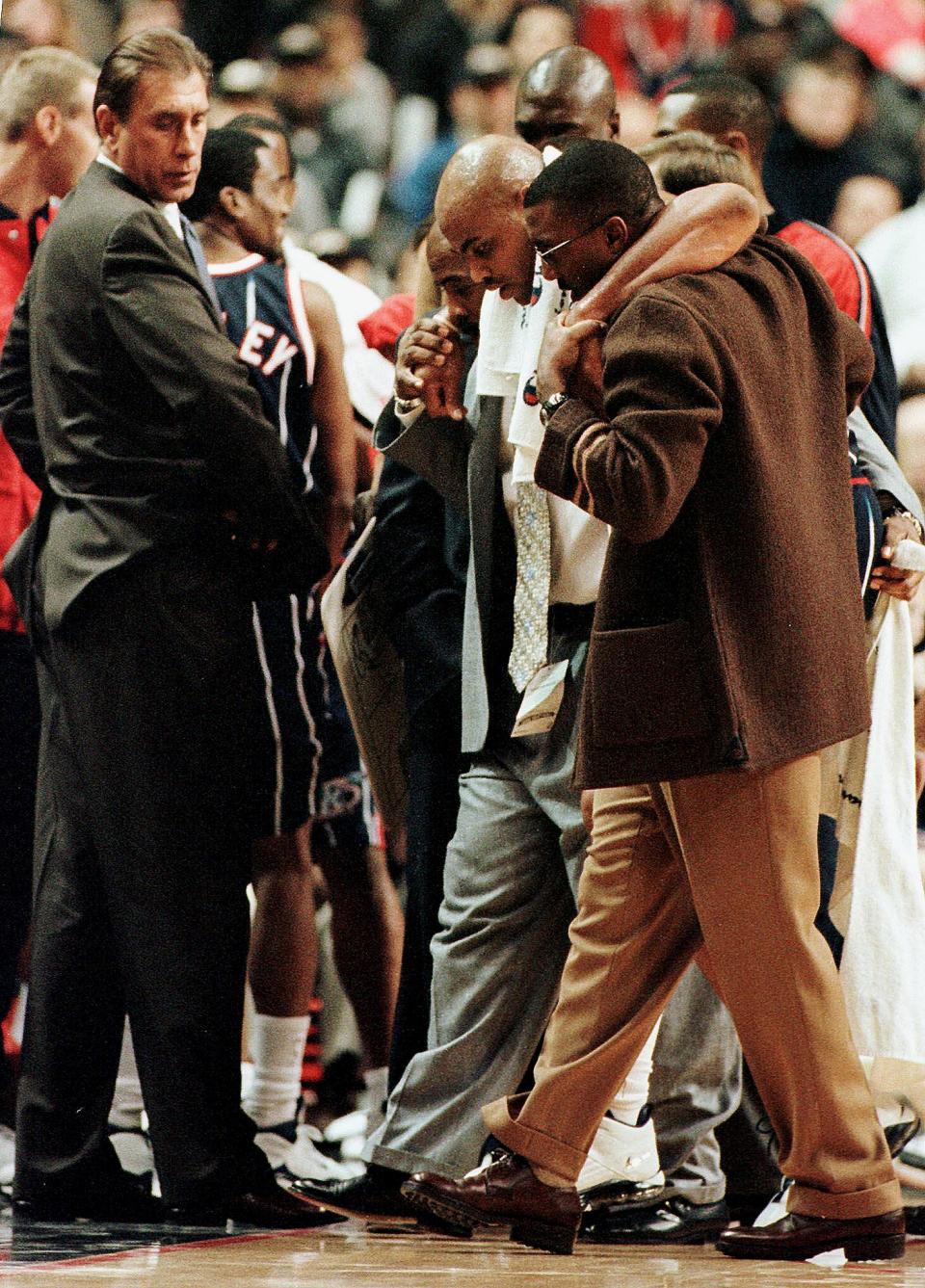
(TOM MIHALEK/AFP via Getty Images)
With both teams struggling to break 20 for the quarter, Charles grabbed an offensive rebound and thought he could post up Todd MacCulloch, the Sixers’ seven-foot rookie. Though he was still getting 10 rebounds a game, Charles’s offense had taken a sharp turn due to his health. “I was pump-faking so much I had to go see the chiropractor like three days a week,” Charles said years later about that period in his career.
As the Sixers sprinted down the floor in transition, Tyrone Hill, a journeyman power forward, drove the baseline. Never known as a shot blocker, Charles went up to redirect Hill’s shot. Then, he lost his balance.
When the admittedly out-of-shape Charles landed awkwardly, he felt that something was seriously wrong. Unable to move, he immediately grabbed his left knee.
“I thought he was gonna get right back up,” Hill said. “When he was down for a long period of time, I was hoping it was nothing really serious.”
By the time Rockets’ trainer Keith Jones came over, Charles’s knee was bloody and grossly distorted. The celebratory mood inside the old Spectrum, then called the First Union Center, had turned to gloom.
“We could see that quad muscle roll up on his leg in a horrible and frightening way,” said Rockets’ radio announcer Jim Foley. “It was like seeing someone break a leg.”
Rupturing his quadriceps tendon brought a new kind of pain – worse than any he’d experienced in the past.
“I knew it was over as soon as I saw it,” Barkley said. “I saw the way the kneecap was bulging through my leg and I said, ‘Well, it’s been fun .’” Barkley was grimacing, but silent. He lay immobile on the floor, talking quietly to Jones, his teammates, and coaches, with 19,109 people staring on in horror. “You didn’t hear a shriek of pain, but you saw the end of a career,” recalled Phil Jasner of the Philadelphia Daily News. “You knew, without question, that it was over.”
Barkley was helped off to the locker room, limping, with his head down and towel around his neck. He needed some time to compose himself before returning to a spot behind the Rockets’ bench on crutches, wearing a knee brace. Looking down the bench, Rudy Tomjanovich held out hope that Charles hadn’t played his last game, but said he was crushed knowing he likely would not call Barkley’s number again.
“You’re just not coming back from that,” the coach said.
Charles would sign about one hundred autographs and joked with teammates and coaches, trying to lighten the mood. When the final buzzer sounded on a forgettable 83–73 win for the Sixers, Charles received another thunderous ovation as he used crutches to leave the court one final time.
On a training table, his knee was wrapped in ice when he called Maureen. Tears rolled down his cheeks as he relayed the news he was just beginning to come to terms with.
“It’s over,” he said to his wife.
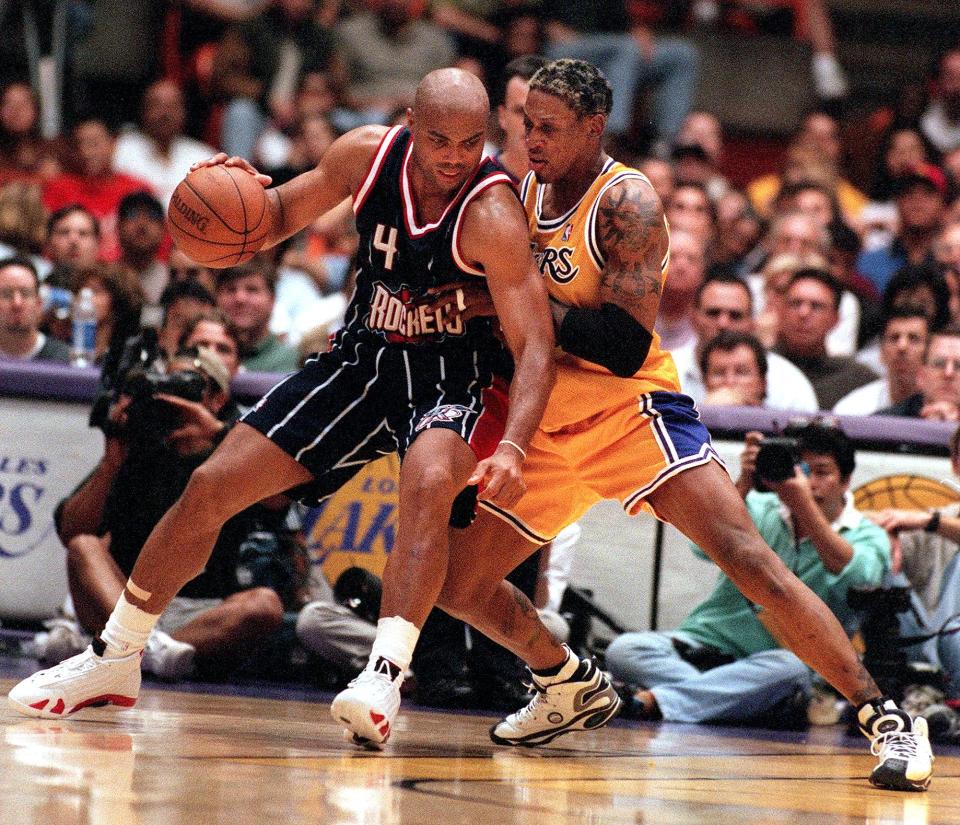
(GERARD BURKHART/AFP via Getty Images)
He limped and waddled to the podium for the postgame press conference. Wearing an all-black suit, as if he were attending his own funeral, Barkley had Johnnie Mae sitting to his right. The room was packed with local and national media, many of whom had covered Barkley throughout his sixteen-year career.
In true Charles fashion, he had a slight grin and a one-liner ready.
“I’m just what America needs – another unemployed Black man,” he said.
He limped back to his Philadelphia hotel room after going out with his teammates to Bridget Foy’s. He told Sixers star Allen Iverson, whom he had taken to task for treating the game like a birthright, that it was his league now and to cherish his time on top.
Sitting on the hotel bed, Barkley was no longer invincible. Yet fittingly, almost poetically, his career had all but ended in the city where it all began. He cried.
A red light flashed on the room phone. Barkley picked up the receiver and began to listen to the dozens of messages left for him. The first voice mail? It was Michael Jordan.
“I’m here if you need me,” his friend said.
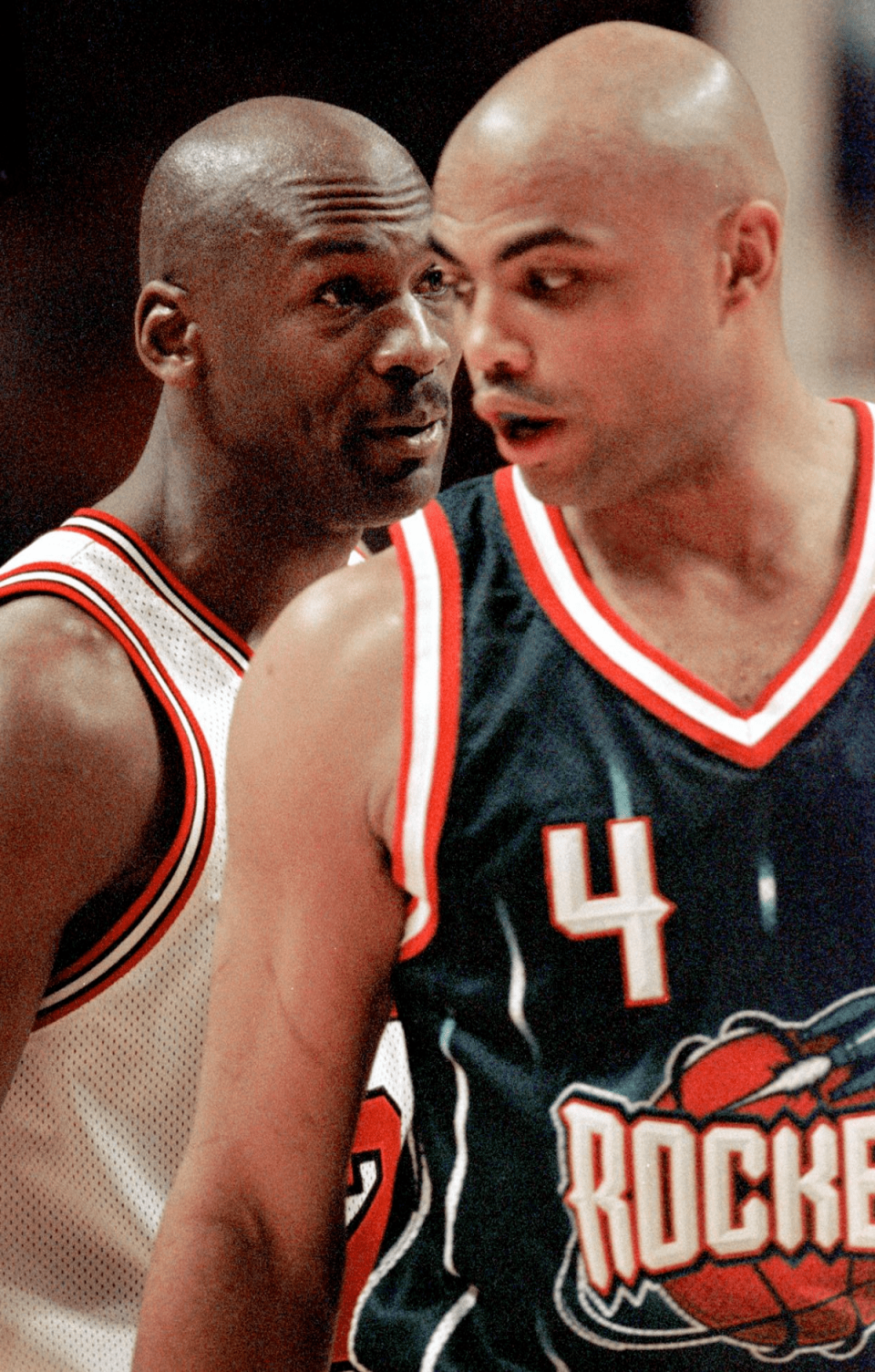
(VINCENT LAFORET/AFP via Getty Images)
He had scripted a much grander end. In fact, the end had begun before the season, when he had announced his sixteenth season would be his last. He had done it in grand fashion, returning to his native Alabama for a preseason game in October 1999.
That night, down a back hallway of the Birmingham-Jefferson Civic Center, Charcey had reserved a meeting hall for family and friends who made the short twenty-one-minute drive from Leeds to celebrate their hero over ribs, chicken wings, pasta salad, and cornbread. The mayors from Leeds and Birmingham stood by the entrance with the Barkley brothers and Michael Glenn, a cousin, and Charcey, eagerly awaiting the guest of honor.
“It’s always special to see him play,” Charcey told friends lingering by the door after the October exhibition. “Just like the first time.”
Standing at half-court with his mom and grandmother, Barkley formally announced his retirement.
“It’s time for me to do something else,” Barkley said. “It’s time for me to have some fun now. I don’t think my life could get any better. But it’s time to do something else.”
In doing so, he also told the crowd of ten thousand that he had donated three $1 million gifts to each of his alma maters, Leeds High School and Auburn University, and to Cornerstone Schools of Alabama. In total, the donations accounted for a third of his salary that year.
Sonny Smith, his coach at Auburn, lauded his former player’s “generosity and love for the area.” The two had come a long way since Barkley nearly transferred out of the school.
Everyone wanted a piece of Barkley that night. He didn’t have time to eat or drink. He took photos and signed balls. He never said no; it wasn’t in his nature. Hugging his grandmother on the way out, he was happier than he had been in a long time.
“It’s a great night for me,” Barkley said to his guests. “I feel great relief and am at peace with myself.”
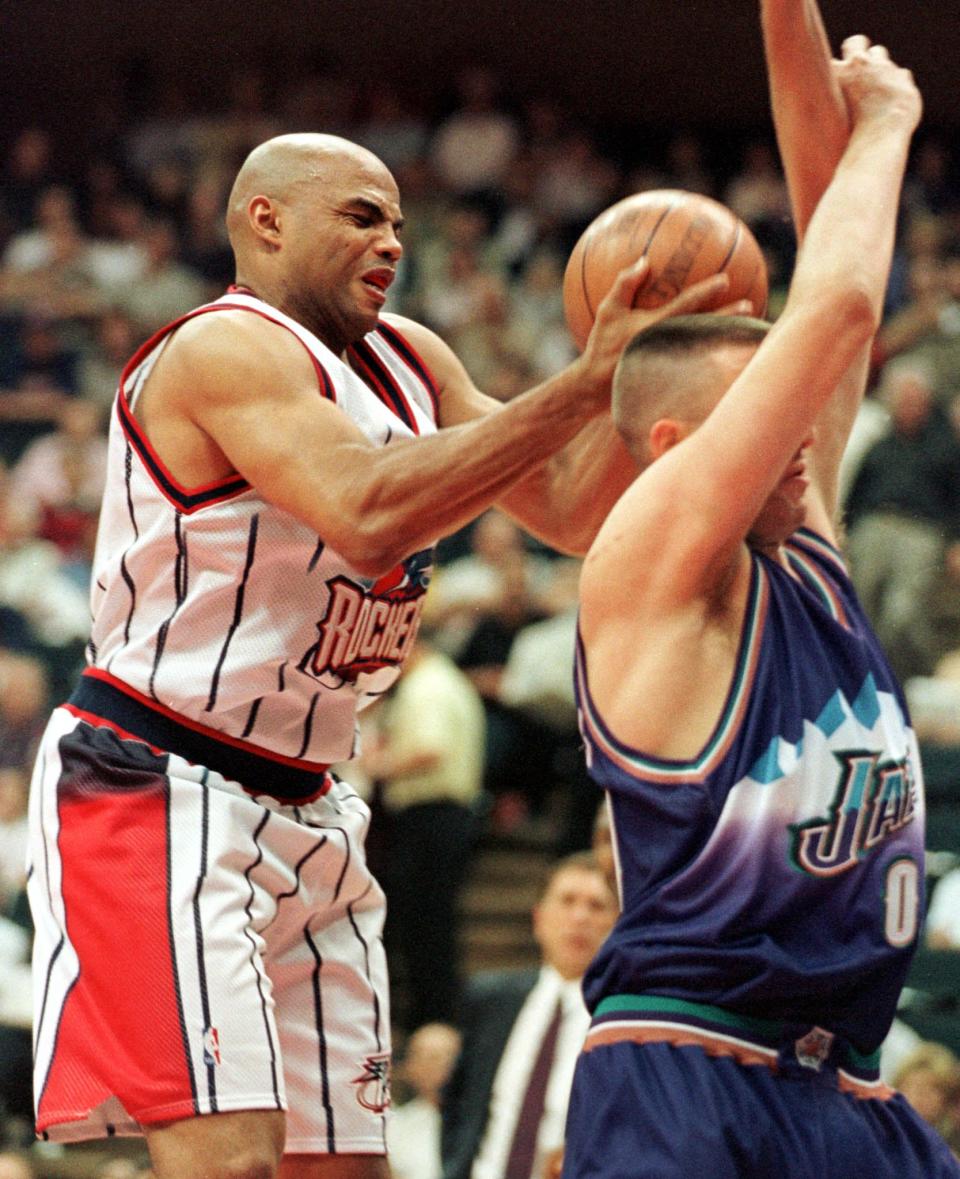
(PAUL BUCK/AFP via Getty Images)
The four months following Barkley’s injury had him balancing a future in which he wanted to “learn to play the piano, finish college, and get really, really, really fat.” But he was also rehabbing as much as he could to achieve one last goal on the court: to play a few minutes and leave the sport with dignity.
“My objective is to play in the last game of the year,” he said. “I want to be able to walk off the court.”
With his left leg still in an immobilizer, trainer Tim Grover forbade him from taking to the court until he had the cast removed. Grover, who had trained the likes of Jordan, Scottie Pippen, and Kobe Bryant, had continued working with Charles in Houston because, as he noted in his 2013 book Relentless, Charles was “probably the most athletically gifted individual I’ve ever seen.” Though he trusted his trainer, Charles rejected his suggestion.
“He looked at me with that death stare and demanded a ball,” Grover said. “Then he stood under the basket and dunked ten times off the healthy foot. Dunked. Ten times. One foot.” He added, “The boot never touched the ground.”
For the last game of the season, fans came ready with their Barkley bald caps and No. 4 jerseys for the Rockets’ match-up against the Vancouver Grizzlies.
For one night, Barkley was back.
“He’s done a lot for this organization and if he wants to walk off the court instead of being carried off, then I’m all for that,” Tomjanovich said. “It also gives the people a chance to pay one last tribute to him.”
His knee was maybe 70 percent. But nothing was going to stop him from playing in his last game on April 19, 2000.
Not everyone was going to make it easy on him. Lionel Hollins, his assistant in Phoenix who was the interim head coach for Vancouver, wanted to do whatever he could to prevent him from scoring on his team.
“I told the players, ‘I don’t care if it’s his last moment, we’re not going to let him have anything,’” Hollins recounted. “As much as I love Charles, we were not going to give him anything. He really shouldn’t have been in the game.”
Charles, for his part, was feeling nostalgic.
“This is a sad day for me,” Barkley said. “I’ve been playing basketball since I was nine years old and now, I’m not going to be playing anymore. That’s the only thing that makes me sad. I won’t miss the limelight.”
While the circumstances of his last game were not what he envisioned, Barkley was getting to enjoy himself. But first, he had to be good, at least for one more moment.
“It’s important for me from a mental standpoint to get out there,” he said before the game. “It’s a mindset thing. It’s been a grueling ordeal to get to this point. I just want to walk off under my own power.” He added: “It’s just something I have to do. I don’t have anything else to prove.”
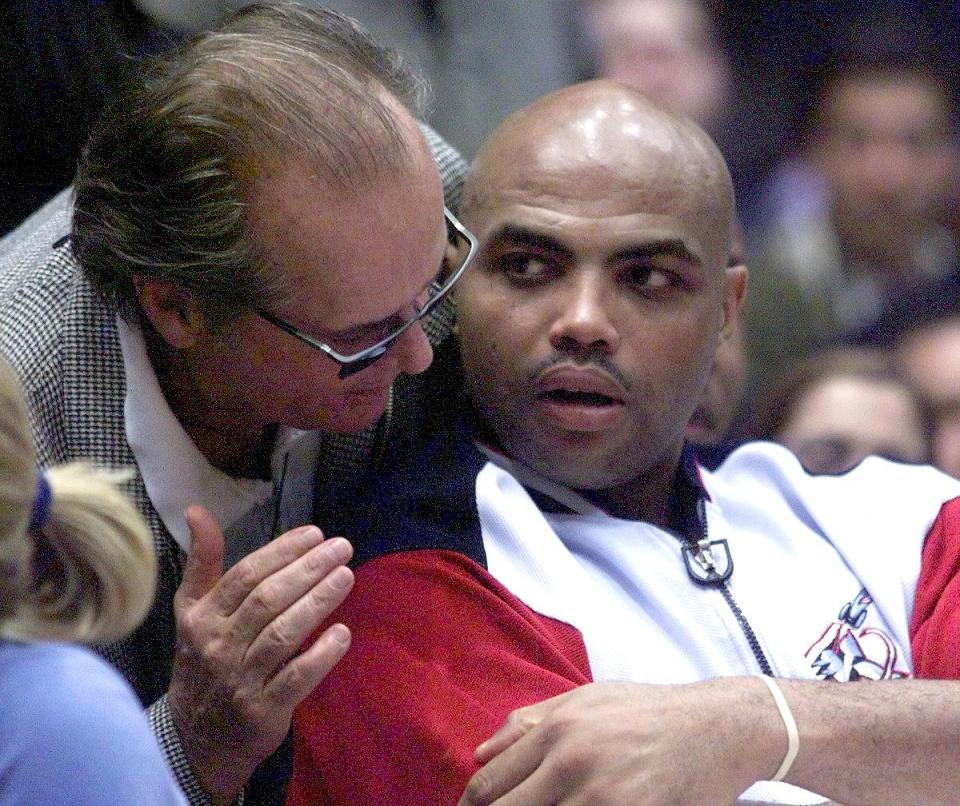
(AFP via Getty Images)
Starting off on the bench, Charles was all smiles. His youthful vigor had returned. Almost four minutes into the second quarter, Tomjanovich got to call Charles’s number for the last time. He rose from the end of the bench, snapping off his warmup pants and red shirt. At the next substitution, the crowd jumped to its feet. He was nowhere close to a hundred percent, looking nervous as he checked in. He might have been only months removed from playing, but Charles was mostly stationary and looked almost out of place on the floor.
The contest between two sub- .500 teams took a back seat to the bigger question of the night: Could Charles produce one more glimpse of greatness?
Almost immediately, the power forward tried to do just that. Off a pick and roll with Cuttino Mobley at the 3-point line, Charles rolled toward the baseline, waiting for the pass. Mobley flung the ball to an open Charles. You could hear the crowd begging Barkley to shoot. He paused for one second before launching a baseline jumper. The ball bounced off the front iron and the crowd sighed.
In the second quarter, shortly after another shot clanged off the rim, Barkley’s body began to break down. A couple of possessions later, backup guard Moochie Norris got a screen from Matt Bullard at the left wing of the 3-point line. Norris slipped through two defenders and made a run at the hoop. In two dribbles, Norris got to the lane and floated a one-handed teardrop over the outstretched arm of Obinna Ekezie. Down low stood Barkley, boxing out Felipe Lopez, a guard with the same height but not nearly the same size. Charles hadn’t really tested out his capacity to rebound.
Luckily, he didn’t have to jump too much. The ball careened almost directly to him. With whatever spring he had left in his knees, he snared the ball from a jumping Lopez and pulled it to his hips. He wasn’t going to pass it. Not now.
“Charles! Charles!” yelled Rockets’ color man Calvin Murphy from the sidelines.
Barkley threw a wild pump-fake before laying it off the glass, drawing contact from Ekezie. Count the bucket. And the foul. The crowd hadn’t been that loud all season.
“Charles Barkley,” rumbled play-by-play man Bill Worrell, “gets a bucket in his final game!”
He was stone-faced in the seconds that followed, taking high-fives from an excited Bullard and rookie Steve Francis. When he walked toward Mobley, he offered the slightest nod, before finally letting out a smile.
“About time,” he told Mobley, hugging him at the free throw line. Barkley shrugged and smiled. What more could he have asked for?
Soon after he missed the free throw, Tomjanovich called Kenny Thomas’ number, telling the twenty-two-year-old rookie to check in for Barkley. He had played six minutes and seven seconds, scoring 2 points and grabbing a rebound. He laughed coming off the floor to a standing ovation, with Tomjanovich wrapping his arm around his neck and Rogers giving him a bear hug.
At halftime, Dawson presented Charles with the backboard that he just grabbed his last rebound from only minutes earlier. “You really own this one,” Dawson told him.
Charles then walked over to the baseline to give an interview to Craig Sager, the TNT sideline reporter known for his warm demeanor and outlandish suits. Sager asked Charles if coming back for one night had been worth it.
“It was worth it. It was definitely worth it,” he said to Sager. “I put a lot of time and effort into my rehab. Hey, my last memory was scoring a basket, not being carried off the court. That was a bonus. I really just wanted to get a rebound, and it took me a long time to get a rebound. The doctor was nervous the whole time because my knee is only about 70 percent. And that rebound came to me, so I got lucky. I couldn’t have jumped to get it.”
Sager reminded him that he was about to finish his career in the top-15 all-time in points and rebounds.
“Well, the big fella up there gave me some stuff that a lot of people didn’t have,” Charles replied. “I can’t take credit for it. I want to, but I can’t. God just gave me a tremendous amount of ability. I can’t take credit for it though, Craig.”
The Rockets lost, but no one cared. It was Barkley’s night. He offered a few words to the team, saying it had a bright future with Francis and Mobley. “It’s unfortunate I didn’t come to Houston until I was on the downside,” he told the fans. “I wish I could have played my entire career here.”
His voice quavering, he gripped the microphone and pushed aside his regrets to convey his gratitude.
“Basketball doesn’t owe me anything, I owe everything in my life to basketball – everything,” he said. “I’m thirty-seven years old. I’m rich beyond my wildest dreams. I have great material things. I’ve been all over the world and it’s all because of basketball.”

(ROBERT SULLIVAN/AFP via Getty Images)
He retreated from the standing ovation to the locker room, where his teammates were waiting for him with beer and champagne, hoots and hollers. He never won an NBA title, but this champagne was a celebration of everything Charles had accomplished.
Soaked in sweat and alcohol, Barkley talked to reporters in the locker room one last time. The regularly loud Barkley grew quieter than usual, taking on the kind of reflective, humble tone he had shown to Sager earlier in the night. All he ever wanted, he said, was to make $1 million and play in the league for ten years. His only goal was to take care of his mother and grandmother.
As cocky and insufferable as he was at times, he never expected to be talking about his own Hall of Fame career, he said. The individual numbers speak for themselves. Career averages of 22 .1 points, 11 .7 rebounds, and 3 .9 assists in 1,073 games. He’s one of the most prolific offensive rebounders in the game’s history and the shortest player to ever lead the league in total rebounding. He made eleven All-Star teams and twelve All-NBA squads in sixteen seasons. Charles finished top-ten in MVP voting in nine years, including his first-place finish in 1993. As of publication, he is one of seven players in league history to record 20,000 points, 10,000 rebounds, and 4,000 assists – and by far the shortest to do so.
So, how did it happen? Even with his mistakes, and there were too many to count, his exhaustive charisma pulled him toward success and worldwide adoration.
“The difficult thing is that nothing I’ll do in my life from now on will come close to what I’ve accomplished in basketball in the last sixteen years,” he noted.
But he sure as hell had to try.
Barkley: A Biography by Timothy Bella. Hanover Square Press; Original edition (November 1, 2022).
Story originally appeared on HoopsHype



